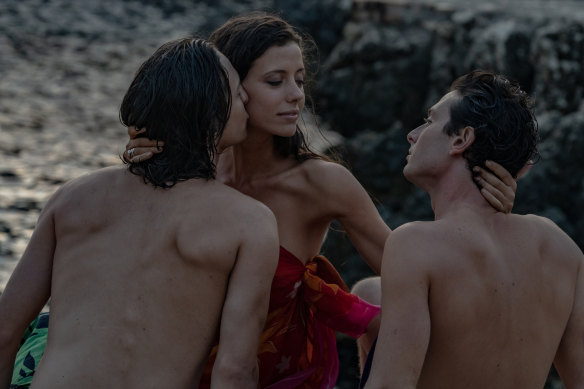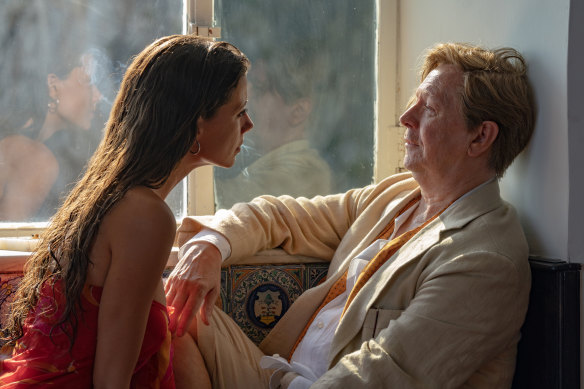
PARTHENOPE ★★★
(MA) 136 minutes
It’s tempting to say Paolo Sorrentino’s films resemble ads, but on reflection there aren’t many ads that resemble films by Paolo Sorrentino. The exceptions are mostly those ads directed by Sorrentino, like the one he did in 2022 for Bulgari, with Anne Hathaway and Zendaya twirling in a Roman villa, while petals rain from the ceiling and a peacock twitches its tail.

Celeste Dalla Porta with Daniele Rienzo and Dario Aita in Parthenope.Credit: Gianni Fiorito
In his new film Parthenope, Sorrentino strives to maintain the same lyrically deranged mood over more than two hours, aided by a different pair of collaborators. The first is the city of Naples, like a coloured ribbon unfurled between sky and sea. The second is the 26-year-old star Celeste Dalla Porta, who is more or less a newcomer to the screen (she had a bit part in Sorrentino’s last film The Hand Of God, and has done some TV).
Youthful heroine Parthenope is meant to be impossibly beautiful, and no one will deny Dalla Porta fits the bill. What she does in the film is closer to modelling than acting in the usual sense: she strolls through her scenes giving wry, tender, knowing glances, implying deep feelings without entirely letting on what they might be. But this, too, fits the conception of the character, who is really less a character than a symbol – representing Naples, or the idea of beauty itself, in an almost impersonal way.
Coming of age in the theoretically tumultuous 1970s, Parthenope loves the world but keeps her distance: even when she lets herself be seduced by one of her many admirers, the rapture never lasts. Her one abiding passion is for study, at which she excels, and for her crusty academic mentor (Silvio Orlando), whose bond with her is platonic in the strictest sense.

Dalla Porta and Gary Oldman, who plays one of Parthenope’s many suitors.
Still, miracles do happen: one moment she’s reading the short stories of John Cheever, the next Cheever himself (Gary Oldman) manifests in person like a genie, scattering pearls of jaded wisdom (“Beauty is like war”) and nearly falling off his chair.
Terms such as “allegory” and “magic realism” undoubtedly apply. But a better description is that the film takes place in the world in which high-end advertising conjures up – glamorous and self-ironising, where your heart’s desire can lie around any corner provided you’re not yearning for anything more than a necklace or a glass of champagne.



